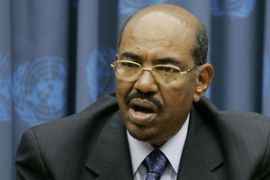Sudan rejects Annan criticism
UN secretary-general accuses Sudanese government of inaction in Darfur.

Agreement rejected
Al-Bashir said: “If there are any problems in Darfur, it is because of the activities of the National Redemption Front, which was formed after the Abuja agreement.”
| Your Views |
|
“I think we should be clear where the failure lies” Kofi Annan, UN secretary-general |
The front brings together Darfur fighter groups which rejected the agreement, signed in the Nigerian capital, Abuja, by the government and only one major opposition faction.
Al-Bashir said: “This force was formed with obvious encouragement from the international community, because it was agreed that whoever won’t sign the peace agreement and tries to disrupt peace in Darfur will be punished.
“This group is receiving huge support in terms of weapons, equipment and vehicles through the border,” he added, referring to the border between Darfur and neighbouring Chad.
The Sudanese president said: “How come we are prevented from standing against the Redemption Front and at the same time called upon to protect the citizens from them?”
“Responsibility to protect”
Annan told reporters in New York the Sudanese government had a responsibility to protect its citizens and had clearly failed to do so.
“In time, they may have to answer collectively and individually for what is happening in Darfur,” Annan said. “I think we should be clear where the failure lies.”
Bashir has rejected the UN proposal of a “hybrid” force, saying “colonial powers” want to reassert control of Sudan.
Andrew Natsios, a US envoy, will arrive in Khartoum on Saturday, in another attempt to persuade the Sudanese government to change its mind.
The African Union has approximately 7,000 troops in the vast desert region of Darfur but its force is widely viewed as lacking the funds, manpower and equipment to maintain security.
Hundreds of thousands of people have been killed and 2.5 million people driven from their homes since early in 2003.